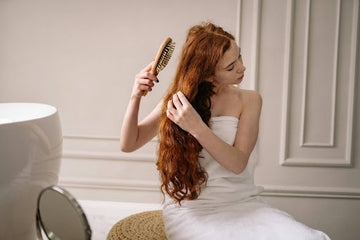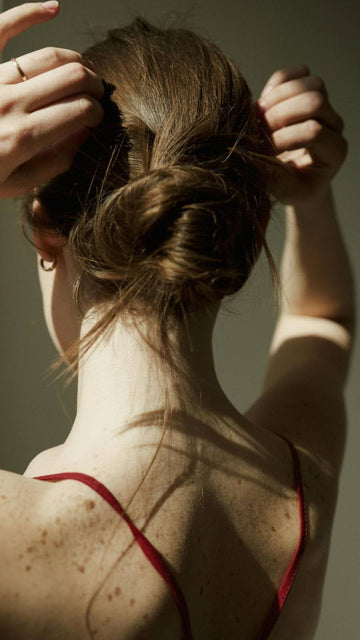Dryness, be gone! 9 of the best dry scalp treatments for under $30
Whether you’ve got psoriasis, eczema, or a classic case of dry skin, here's how to ease it on a budget
Every day, you wake up, ready to face the day, only to be met with the annoying itchiness and unsightly white flakes of a dry scalp *sigh*. That alone is enough to put a damper on even the best of hair days, which can derail your confidence and make you stressed about what to do with your hair—and don’t get us started on when it’s time to have an LBD moment, because nobody wants those dry flakes falling on their shoulders.
The discomfort, both physically and emotionally, can be downright frustrating. But before you resign yourself to a fate of endless scratching and embarrassment, know this—you are not alone, and natural remedies at low prices are out there.
Dry scalp woes can stem from a variety of factors, ranging from everyday dandruff to more serious conditions like seborrheic dermatitis and psoriasis—and even something as seemingly simple as scalp dryness or irritation can lead to this uncomfortable sensation.
But fear not—there's hope on the horizon. We’ve done some scouring to bring you nine budget-friendly solutions that promise to banish flakes and itchiness without breaking the bank. Say hello to a healthy, happy scalp, because it’ll soon be on your radar.
Dry scalp vs dandruff—what’s the difference?
While it's not our job to diagnose you (it's best to reach out to a dermatologist for an accurate assessment) all of these issues have a common ground. That is the dysregulation of skin cell turnover and low sebum production.
For some, dandruff may be the culprit, caused by a yeast or bacterial imbalance on the scalp. Others may find themselves grappling with dryness due to harsh shampoos, sensitivity to fragrance, or environmental factors like low humidity or hot showers. Certain medications, hormonal changes, and even age can also play a role in exacerbating dry scalp issues.
Before diving into the best dry scalp treatments, it's essential to understand the distinction between dry scalp and dandruff. While both conditions can result in flaking and itching, they have different underlying causes and require specific treatments.
Dry scalp
A dry scalp occurs when the skin on the scalp becomes dehydrated, leading to itching, flaking, and discomfort. It can be caused by various factors, including:
- Harsh shampoos: Using a shampoo that strips the scalp of its natural oils can contribute to dryness.
- Low humidity: Dry air, especially during winter months, can sap moisture from the scalp.
- Sensitivity to fragrance: Some individuals may experience scalp irritation due to fragrances in hair products.
- Hormonal changes: Fluctuations in hormones, such as during puberty or menopause, can affect scalp health.
- Advanced age: As we age, the skin's ability to retain moisture diminishes, leading to dryness. Did you know that when we turn 25, the collagen in our body drops significantly, and then 1% drops every year after that? Collagen helps reduce scalp inflammation and dryness, which is the main issue with a dry scalp. So make sure to pack in your collagen supplements because girl, we need them.
Everyday dandruff
Dandruff is a common scalp condition characterized by white or yellowish flakes of dead skin that shed from the scalp. While the exact cause of dandruff is not fully understood, it is often associated with:
- Yeast or bacterial imbalance: An overgrowth of yeast or bacteria on the scalp can contribute to dandruff.
- Sebum production: Excessive sebum production can lead to an oily scalp, which may exacerbate dandruff.
- Skin cell turnover: Accelerated turnover of skin cells on the scalp can result in the formation of flakes.
Seborrheic dermatitis and psoriasis
In some cases, what appears to be a dry scalp may actually be a more serious condition such as seborrheic dermatitis or psoriasis. These conditions involve inflammation of the scalp and can result in symptoms similar to a dry scalp, including itching and flaking. Seborrheic dermatitis is characterized by greasy, yellowish scales, while psoriasis often presents as thick, silvery scales accompanied by redness and inflammation.
How to treat a dry scalp?
While mild cases of dry scalp and dandruff can often be managed with over-the-counter treatments, we do recommend reaching out to a dermatologist if symptoms persist or worsen. A dermatologist can provide an accurate diagnosis and recommend appropriate treatment based on the underlying cause of the scalp condition.
Now, let's take a look at some natural alternatives of a dry scalp home treatment. We promise they’ll be under $30, so you can forget about splurging with these.
1) Tea tree oil treatment
Tea tree oil is renowned for its potent antimicrobial and anti-inflammatory properties, making it the perfect essential oil to combat a dry scalp. This natural remedy helps soothe irritation, reduce inflammation, and fight fungal infections that may contribute to dryness and flakiness. When diluted with a carrier oil and massaged into the scalp, tea tree oil can help moisturize dry skin, promote healthy hair growth, and alleviate itching and discomfort.
Regular use of tea tree oil treatment can leave the scalp feeling refreshed, revitalized, and free from flakes, and we recommend using it two to three times per week.
PSA: When going for tea tree oil as a hair and scalp treatment, you need to ensure you're using an essential oil rather than a fragrance oil. Essential oils are extracted through various methods such as hydrodistillation, steam distillation, dry distillation, or mechanical cold pressing of plants. In contrast, fragrance oils are typically synthetic and lack the health benefits found in essential oils. You can get Tea Tree Oil for as little as $12, or a daily shampoo such as the Paul Mitchell Special Detox Tea Tree Kombucha Rinse for just over $20.
Pros:
- Effective antimicrobial and anti-inflammatory properties
- Soothes irritation and reduces inflammation
- Combats fungal infections and promotes healthy hair growth
- Moisturizes dry scalp and alleviates itching
- Leaves the scalp feeling refreshed and revitalized
Cons:
- Some people may experience skin sensitivity or allergic reactions
- Requires proper dilution with a carrier oil to prevent skin irritation
- The strong smell can be a little off-putting. But beauty is pain, right?
2) Apple cider vinegar rinse
Apple cider vinegar is a versatile ingredient that can help restore the pH balance of the scalp, regulate oil production, and eliminate dandruff-causing fungi and bacteria. When diluted with water and applied to the scalp as a rinse, apple cider vinegar helps exfoliate dead skin cells, reduce itchiness, and soothe inflammation. Additionally, its acidic nature helps close the hair cuticle, leaving the hair shaft smoother and easy to style—talk about a multitasker.
Regular use of an apple cider vinegar rinse can promote scalp health, improve hair texture, and prevent future dryness and flakiness—meaning a whole step closer to a dryness-free scalp. The Renpure Plant-Based Apple Cider Vinegar Clarify & Shine Scalp Serum is a brilliant choice for under $10, and it can be used as both a serum and a scrub. It’s the real deal.
Pros:
- Restores pH balance and regulates oil production
- Eliminates dandruff-causing fungi and bacteria
- Exfoliates dead skin cells and soothes inflammation
- Leaves hair shaft smoother and more manageable
- Promotes scalp health and prevents future dryness
Cons:
- Strong odor can be off-putting, but aren’t they all?
- Requires proper dilution to avoid skin irritation or damage to the hair shaft
3) Coal tar shampoo
Coal tar shampoo is a medicated treatment commonly used to alleviate symptoms of psoriasis, seborrheic dermatitis, and other scalp conditions characterized by dryness, flaking, and inflammation. Coal tar works by slowing down the excessive growth of skin cells on the scalp, reducing itching, and promoting the shedding of dead skin cells. While it does have a *slight* odor (just an FYI) coal tar shampoo is highly effective in controlling symptoms of dry scalp and restoring scalp health.
Regular use of coal tar shampoo can help manage chronic scalp conditions and provide long-lasting relief from dryness and irritation. We’d go for the Polytar Tar Medicated Scalp Cleanser Shampoo as it is $27 and works like magic.
Pros:
- Alleviates symptoms of psoriasis, seborrheic dermatitis, and other scalp conditions
- Slows down excessive growth of skin cells and reduces itching
- Promotes shedding of dead skin cells and restores scalp health
- Provides long-lasting relief from dryness and irritation
Cons:
- This is STRONG smelling, so brace yourself and prepare.
- Prolonged or frequent use may cause discoloration of light-colored hair or fabrics
4) Salicylic acid treatment
Salicylic acid is a beta hydroxy acid that penetrates the skin's surface to exfoliate dead skin cells, unclog pores, and promote skin renewal. When formulated into a shampoo, salicylic acid can help remove excess oil, dirt, and flakes from the scalp, leaving it clean, refreshed, and free from flakiness. Salicylic Acid Exfoliating Scalp Treatment is just $16 and is guaranteed to work after just one use.
The product is particularly beneficial for individuals with oily or acne-prone scalp, as it helps regulate sebum production and prevent the buildup of dead skin cells that can contribute to dryness and irritation. Regular use of salicylic acid shampoo can improve scalp health, reduce dandruff, and promote a balanced, hydrated scalp environment.
Pros:
- Exfoliates dead skin cells and unclogs pores
- Removes excess oil, dirt, and flakes from the scalp
- Regulates sebum production and prevents buildup of dead skin cells
- Improves scalp health and promotes a balanced, hydrated scalp
- Reduces dandruff and flakiness
Cons:
- May cause dryness or irritation with prolonged or frequent use, which is why we recommend using a clarifying shampoo to keep your scalp clean
- Not suitable for individuals with sensitive skin or scalp conditions
- Some people may experience skin sensitivity or allergic reactions
5) Coconut oil treatment
It may be one of the oldest tricks in the book, but coconut oil works wonders for every quam. Coconut oil is a natural moisturizer that can help hydrate and nourish dry, flaky scalp. Viva Naturals Organic Extra Virgin Coconut Oil is a top-rated coconut oil for scalp treatment, and for under 10 bucks, you can do no wrong. When applied to the scalp and hair, it forms a protective barrier that locks in moisture, soothes irritation, and leaves your locks full of shine.
Regular use of coconut oil treatment can improve scalp hydration, strengthen hair follicles, and promote healthier, more resilient hair growth.
Pros:
- Natural moisturizer that hydrates dry scalp
- Forms a protective barrier to lock in moisture
- Soothes scalp irritation and discomfort
- Strengthens hair follicles and promotes healthier hair growth
- Versatile and can be easily incorporated into hair care routine
Cons:
- May leave hair feeling greasy if applied in excess, but so do hair masks, and this works just as good
- Not suitable for those allergic to coconut oil (if it wasn’t obvious)
- Can be difficult to wash out of hair due to its thick consistency
6) Aloe vera gel application
Aloe vera gel is a soothing agent that can provide relief from dry scalp, itching, and inflammation. Seven Minerals Organic Aloe Vera Gel is a high-quality aloe vera gel suitable for scalp application that is under $20. It helps hydrate the scalp, reduce irritation, and promote healing. Its cooling sensation provides instant relief from discomfort, making it an ideal choice for soothing dry, itchy scalp.
Pros:
- Soothes dry scalp, itching, and inflammation
- Provides instant relief with its cooling sensation
- Hydrates the scalp and promotes healing
- Lightweight and easy to apply
- Suitable for sensitive skin and scalp
Cons:
- May not be as moisturizing as other treatments for severely dry scalp
- Requires frequent reapplication for long-lasting relief
- Some people could be sensitive to aloe vera and experience allergic reactions
7) Zinc pyrithione shampoo
Zinc pyrithione is an effective treatment for controlling dandruff and relieving symptoms of dry scalp and most dandruff shampoos are packed with this ingredient. The Head & Shoulders Clinical Strength Dandruff Shampoo and Conditioner Duo is a popular choice for a zinc pyrithione treatment that works and is kind to your purse. It helps regulate the growth of Malassezia yeast on the scalp, reduces inflammation, and provides long-lasting relief from flakiness and itching.
Pros:
- Effective in controlling dandruff and relieving dry scalp symptoms
- Regulates the growth of Malassezia yeast
- Reduces inflammation and soothes itching
- Provides long-lasting relief with regular use
- Widely available and easy to incorporate into hair care routine
Cons:
- Strong fragrance may be overwhelming, but it is fairly mild compared to most
- Can be harsh on hair and scalp with prolonged use
8) Omega-3 fatty acid supplements
Omega-3 fatty acids are essential nutrients that play a key role in maintaining skin health, including the scalp. Found in fatty fish, flaxseeds, and walnuts, omega-3 fatty acids help regulate oil production, reduce inflammation, and promote skin hydration.
Incorporating omega-3 fatty acid supplementation into your diet can help improve scalp health from the inside out, reducing dryness, flakiness, and irritation, and you can find these supplements for a low cost at any retailer. Regular consumption of omega-3-rich foods or supplements can help strengthen hair follicles, improve hair texture, and prevent scalp conditions associated with dryness and inflammation.
Pros:
- Essential for maintaining scalp and skin health
- Regulates oil production and reduces inflammation
- Promotes skin hydration and prevents dryness
- Strengthens hair follicles and improves hair texture
- Easily accessible through diet or supplements
Cons:
- Results may take time to notice, requiring consistent use
- Some people may experience digestive issues with omega-3 supplements
- High-quality supplements can be expensive
- Dietary sources may not provide sufficient amounts for optimal scalp health
9) Hydrating hair mask treatment
Hydrating hair masks are intensive treatments designed to replenish moisture, nourish the scalp, and restore hair health. Formulated with ingredients like argan oil, shea butter, and honey, hydrating hair masks help hydrate dry, brittle hair, and soothe irritated scalp. You can go for a cheaper alternative and make your own DIY hair mask with essential oils and coconut oil, or you can purchase a store-bought product.
We’d opt for the Grow Gorgeous Rich Scalp Mask, which is an overnight treatment for dry scalps, forming a part of the brand’s dermatologically tested sensitive range. It’s just $3.60 (yes, that’s right, under FOUR dollars) and works as an overnight mask—so your self-care night-in is sorted.
When applied to the scalp and hair, these masks penetrate deeply to deliver essential nutrients, vitamins, and antioxidants, leaving the scalp hydrated, revitalized, and free from flakiness.
Pros:
- Intensively replenishes moisture and nourishes the scalp
- Soothes dry, irritated scalp with natural ingredients
- Penetrates deeply to deliver essential nutrients and antioxidants
- Leaves the scalp hydrated, revitalized, and flake-free
- Strengthens hair shafts and improves overall hair health
Cons:
- Requires time for application and may need to be left on overnight
- Some formulations may contain allergens or irritants for sensitive scalps
- Can be more expensive than regular shampoos or conditioners if you opt for luxury choices
- Results may vary depending on the frequency of use and individual hair type
Always look at the bigger picture
Haircare is a part of self-care, so it deserves to be treated the same as your skin. You wouldn’t go about your day without cleansing your face, so why would you do that to your scalp? Addressing dry scalp issues requires a 360-degree approach, where you should be considering various factors such as underlying conditions, personal preferences, and time constraints.
There are many other things you can do to help your scalp and improve your hair growth, like a scalp massaging brush in the shower, or a silk pillowcase, so make sure to do the best you can to help yourself. By incorporating these budget-friendly treatments into your hair care routine, you can effectively nourish and hydrate your scalp, alleviate discomfort, and promote overall scalp health.
Whether you choose to use natural remedies like tea tree oil and coconut oil or sway towards medicated shampoos and supplements, the key is consistency and finding what works best for your scalp's unique needs. With the right nourishment, a little bit of time, and a heap-load of patience, there really are happier hair days ahead—farewell dry scalp, you will NOT be missed.





